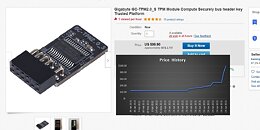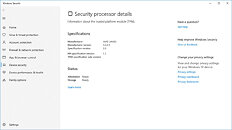Friday, June 25th 2021

Thanks to Windows 11, Scalpers Buy Out Add-on TPM 2.0 Modules
Most modern PC platforms include an fTPM (firmware trusted platform module) of some form. Those that don't, have a TPM 2.0 compatible header on the motherboards. Microsoft's requirement of a hardware TPM for Windows 11 has scalpers go after add-on TPMs, which are typically priced around $20, but now marked up to $100, according to price-tracking by Shen Ye, a senior HTC VIVE exec, who has been tracking prices of add-on TPMs on Twitter.
Scalpers possibly anticipate a rush of ill-informed buyers out for add-on TPMs, who haven't spent 5 minutes digging through their UEFI setup programs for the fTPM toggle. Below is a screenshot of a Ryzen 7 2700X-based machine, paired with an AMD B450 chipset motherboard (a platform from 2018), with its fTPM toggle turned on. The PC now meets Windows 11 system requirements. Windows 11 uses hardware TPMs for secure storage of credentials. "Microsoft, can you not impose a TPM requirement during a silicon shortage? Especially considering most desktop motherboards support TPM only as a purchasable accessory," Shen Ye tweeted.
Source:
Shen Ye (Twitter)
Scalpers possibly anticipate a rush of ill-informed buyers out for add-on TPMs, who haven't spent 5 minutes digging through their UEFI setup programs for the fTPM toggle. Below is a screenshot of a Ryzen 7 2700X-based machine, paired with an AMD B450 chipset motherboard (a platform from 2018), with its fTPM toggle turned on. The PC now meets Windows 11 system requirements. Windows 11 uses hardware TPMs for secure storage of credentials. "Microsoft, can you not impose a TPM requirement during a silicon shortage? Especially considering most desktop motherboards support TPM only as a purchasable accessory," Shen Ye tweeted.


263 Comments on Thanks to Windows 11, Scalpers Buy Out Add-on TPM 2.0 Modules
Laughs in built-in TPM (and not fTPM by AMD).Torvaldcoin? Hodl!
I don't think Windows 11 is going to have that TPM requirement by the end, not for consumers. Maybe for business versions where it makes more sense. I half-expect them to remove the requirement when users do an upgrade from an earlier version of Windows to 11.
Intel 8th gen and up.
Thankfully, I don't need a TPM chip; it's built into my processor.
BSD no drive found.
The really amusing part here is that a Celeron (read Atom) N4000 is supported...
docs.microsoft.com/en-us/windows-hardware/design/minimum/supported/windows-11-supported-intel-processors
It would seem no non Zen architecture AMD CPUs are supported.
docs.microsoft.com/en-us/windows-hardware/design/minimum/supported/windows-11-supported-amd-processors
So yeah M$ just went and set some arbitrary cut off date.
TPM modules are not hard to manufacture and their scarcity is dictated mostly by their uselessness so these scalpers will most likely only help retailers clear out old junk. specially when microsoft walks this back as they surely will
I honestly find this super amusing
Asus TPM on hand.
It'll still let you install, but it'll warn you of the risks (e.g. not actively supported) beforehand. Doesn't seem like much of a problem, the older CPUs (even Ryzen 1000 to an extent) never needed the level of intricate firmware/scheduler/hardware CPPC handshaking that goes on in Ryzen 3000 and 5000 these days.
However, the Secure Boot flag (not Secure Boot being enabled itself) is a hard requirement, so IIRC early pre-Secure Boot UEFI platforms like Sandy Bridge probably won't work without modding the installer. And obviously non-UEFI capable systems, but that's not new.
Anyway, people have already managed to bypass whatever BS M$ tried to pull.
Sooner or later it won't be needed at all.
Microsoft asking for TPM 2.0 and then backtracking to 1.2 but in off channels and keeping the confusion up
People scalping the modules
Calling W11 to a update to W10 and calling it a day
What a show this is going to be